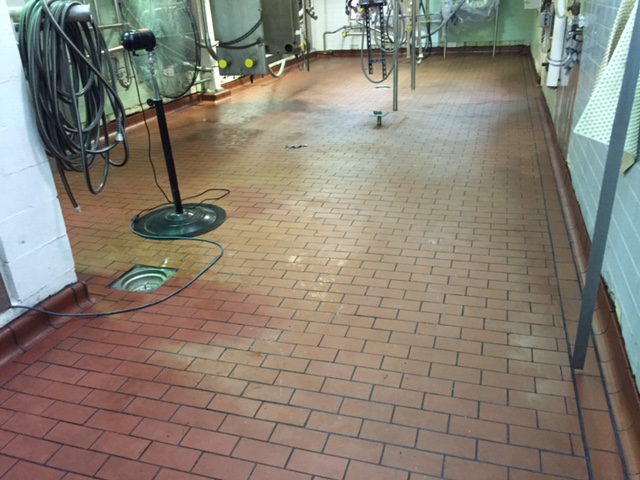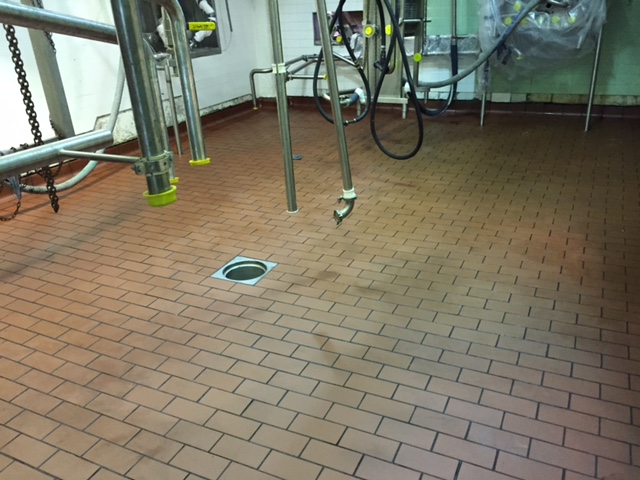FAQs
Do you have an acid resistant grout?
Yes, we offer the perfect solution for grouting brick and tile in industries where the flooring bricks suffer from exposure to various chemical compounds. Commonly approved for use in food-type industries like restaurants, commercial kitchens, distilleries and food processing plants, our epoxy compound holds up against nitric acid, chlorine and other chemical exposures.
How can bricks hold up under the heavy use from equipment and activity in an industrial setting?
Formed from shale, the bricks we supply create a flooring surface, the density of which, has a unique strength suitable for industrial floor applications.
What type of brick should be used in masonry construction?
There are different types of bricks suitable for varying needs. One type of brick is manufactured for applications where low absorption and high acid resistance don’t play a major role. A second style of brick is made for when higher acid resistance and lower absorption are important. A third is needed when minimum absorption but maximum acid resistance is the primary requirement. See ASTM C279-88 for more information on the standards for bricks used in masonry construction jobs.
How is a good bonding surface created?
To ensure a good bond, the surface of bricks and tiles have texture which is created during the manufacturing process. Some methods of texturizing are matting, scoring the bottoms and/or sides of the bricks, and wire cutting. Strict standards determine the depth of the texturing which then enhances the bonding process.
What role do joints and sealants play in brick floors?
It’s vital to put much consideration into the details of your setting beds and grout. If a material is not suitable for use in your plant for a technical reason, then joints made of that material would also not be suitable. For example, can’t have a concrete floor? Then don’t use concrete joints in the brick or tile. Epoxy joints can’t be used if you know you can’t use epoxies because they cannot withstand exposure to certain chemicals. Additionally important, using proper sealants that are also consistent with the material and joints chosen will ensure a comprehensive system and will promote long life of your floor.
My manufacturing plant has one area where thermal shock is a big issue and another where absorption is a primary factor. Can you help?
The ASTM standards laid out in ASTM designation C410-11 cover the four types of industrial floor brick. Type T is used where a high degree of resistance to thermal and mechanical shock is necessary but low absorption is not.
Type H is used where a need for chemical resistance and thermal shock resistance are factors, but again as in Type T bricks, low absorption is not.
Type M is used when low absorption IS a requirement. These types of bricks are usually very abrasion resistant but have a lessor resistance to impact shock.
Type L bricks are used where both minimal absorption and a high degree of chemical resistance is required. They normally have quite limited thermal and mechanical shock resistance. They are, however, highly abrasion resistant.
How easy is it to repair brick floors?
One of the advantages of using acid brick or quarry tile as your floor surface is the reparability. The “standard” brick red color remains virtually the same over the years at our manufacturer so when you do have to fix or replace a section the color matches well, especially as time goes on and the natural process of aging causes the colors to blend and meld. It’s not a complicated process to replace or repair them and the end result is a consistent look.
BRICK & TILE
Standard Polymers offers corrosive resistant bricks and tiles for use in a multitude of markets such as food processing, beverages, steel, pharmaceutical, chemical plants and many others. Dynamically corrosive environments due to chemicals and high temperatures require hard-hitting corrosion prevention solutions in order to maintain your equipment and fight the high costs of repair and replacement. To protect your storage tanks, process vessels and other equipment, these heavy-duty flooring bricks lower surface temps and help safeguard against the onslaught of acid and other chemical corrosion. They are designed specifically for those highly corrosive plants where heavy equipment is in use.
Our brick and tile floors are not only corrosion resistant and functional, they are attractive and - especially important in plants where food is processed - hygienic and meeting or exceeding important government standards. Non-skid surfaces are available to help prevent workplace accidents due to wet and slippery conditions.
Different facility environments have different needs and we have different models to address your specific requirements. The advantages to using the brick instead of coatings are to be found in several arenas: employee safety, cost savings, repairability, and flexibility of application. We also offer specialized grouts for setting floor tiles which provide the strength and chemical resistance required to complete your system.
Contact us for more information or for a personalized quote for your project.





